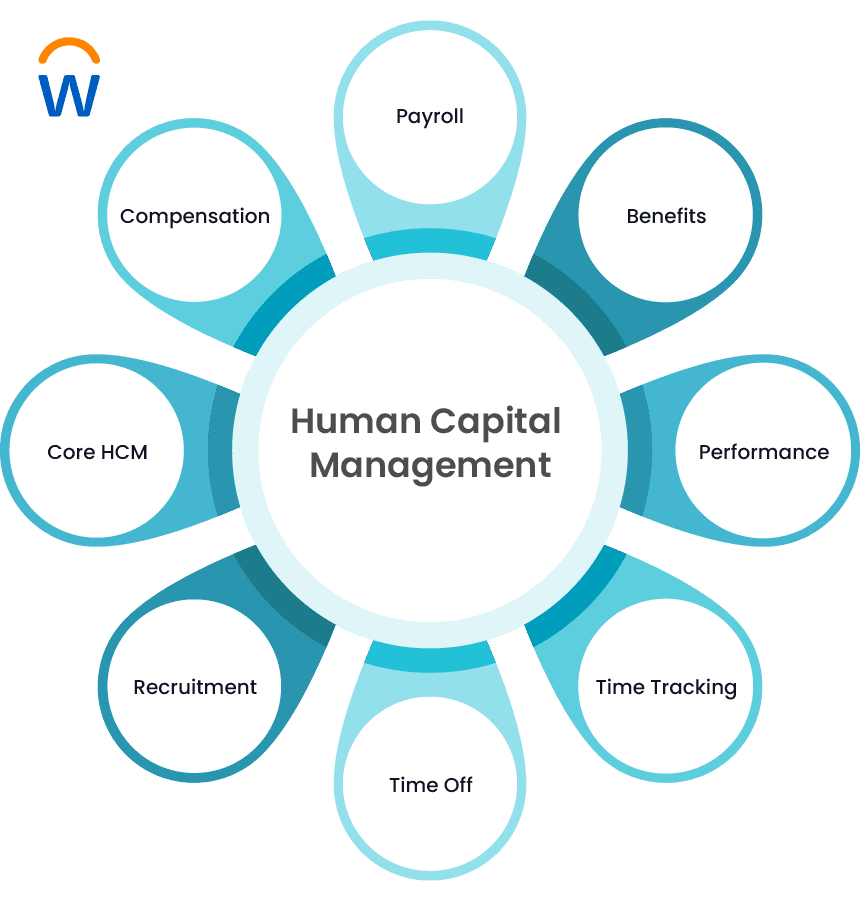The human resources department stands as an indispensable pillar within any business framework. Its pivotal role is evident in the seamless operation of every organization.
Despite being expected to employ cutting-edge technology, HR departments often rely on outdated systems, such as manual payroll processing. Human capital management help firms digitize recruitment, retirement, payroll, attendance, and performance management procedures.
Workday has emerged as a premier HR software solution in today’s corporate landscape.
But what guarantees its seamless performance?
hat is Workday Human Capital Management?
Workday HCM is a Cloud-based system that handles a wide variety of modern business needs. It offers a single solution for all HR functions, streamlining business processes, empowering employees, fostering collaboration across the firm, and aligning teams with strategic business priorities. Workday HCM provides a customizable framework that allows businesses to manage their workforce, ensuring that both the finance and HR teams receive what they require. Workday’s biannual releases ensure that consumers are always on the latest version with up-to-date features, regardless of whether they are using a browser or a mobile device.
Modules of Workday Human Capital Management
The Workday HCM module’s distinct features significantly aid in the simplification of workforce management and a variety of HR activities. Together, they constitute a robust HCM system.

- Human resource management: Workday Human Resource Management offers self-service, easy functions for organizing, staffing, and processing payments.
- Benefits Administration: Workday Benefits Administration platform helps firms define, modify, and manage their benefit programs to match the unique requirements of their business operations. Workday HCM makes it easy to track employee data and apply appropriate employee perks.
- Planning and analytics: Workforce planning and the analytical module provide a fully actionable and dynamic perspective of talent supply and demand, allowing businesses to make more informed decisions and perform better when critical business issues arise.
- Project and work management: The Project and Work Management module allows organizations to focus on critical components such as staff and resource allocation, which contribute to a seamless transition of processes.
- Big data analytics for HCM: Big data analytics delivers valuable workforce information to improve decision-making by combining everyday data and apps. It improves the user experience while providing single-platform security.
- Talent management: Workday HCM talent management helps you improve the management system, developments, alignments, and employee recognition.
- Recruitment and onboarding: The Workday Recruiting module gives businesses complete control over their recruitment processes and allows them to set hiring limits and criteria.
- Payroll solutions: Workday payroll is a comprehensive tool that allows you to completely manage your data, pricing, and payroll operations.
- Time tracking: Workday time tracking module interacts with payroll, project management, and task management to create a simple user experience that is accessible over the internet and on mobile devices.
Learn more: Addressing Workday Implementation Challenges with Test Automation
What Makes Workday Human Capital Management Testing Crucial?
Workday testing is critical for deploying and sustaining the Workday HCM System. Without rigorous testing, a company exposes itself to a variety of risks that may have an impact on its operations and reputation.
Some of the potential challenges are:
- Technical disruptions: Undetected errors can affect HR procedures, from recruitment to payroll, resulting in delays and inefficiencies.
- Data inaccuracies: Without thorough testing, there is a greater risk of data mismatches or oversights, resulting in improper personnel records, payroll issues, or inaccurate reporting.
- Reduced user adoption: If end users encounter numerous issues or find the system unintuitive, they may refuse to utilize the Workday HCM platform, jeopardizing their investment.
- Economic consequences: Failures, particularly in payroll or benefits, can have immediate financial effects, such as overpayments, penalties, or resource-intensive fixes.
- Reputational damage: A company’s internal and external reputation might be harmed by system malfunctions or data breaches that could have been avoided with adequate testing.
Watch now: How to Drive Efficiency in Cloud HCM through Test Automation: A Blueprint with Forrester
How does Workday Testing Impacts Your ROI
Enterprises transitioning to the Workday platform should prioritize testing to ensure a seamless production environment and optimize return on investment (ROI). However, in many organizations, software testing still relies heavily on manual procedures, leading to delays and potential timeline overruns. These delays can have adverse effects on your ROI, resulting in increased costs and effort.
Workday testing typically consumes 50% or more of a project’s schedule. Waiting till the end to test your Workday deployment can cause delays in implementation.
Here’s why,
Shifting testing deadlines and implementing automation at an early stage can reduce the testing load and increase ROI. Enterprises can achieve a favorable ROI on their Workday investment by flexibly responding to market shifts, alleviating competitive pressures, and promptly embracing new capabilities.
Thus, Test automation is necessary to implement and adopt changes.
Choosing the Right Workday HCM Test Automation Tool
Enterprises should look for a Workday testing tool that is not only cost-effective, but also user-friendly. Opkey’s Workday testing solution offers numerous capabilities such as pre-built accelerators, No-code automation, self-healing, and test data management to enhance testing speed, consistency, and accuracy at a lower cost, making it ideal for enterprises seeking to streamline their Workday testing processes.
- Pre-built test accelerators
Opkey provides accelerators for functional, regression, performance, and security testing, reducing the need for subject matter expertise. This eliminates the need for business users to create test scripts from scratch, reducing design time and effort by over 70%. - Self-healing scripts for easy maintenance
Opkey’s self-healing script technology significantly reduces the need for test maintenance. Whenever the test script breaks due to updates or new releases, Opkey automatically finds and resolves the issue without human intervention. Opkey helps you save test maintenance effort by more than 90 percent. - Smart Regressions
Opkey’s AI-powered impact analysis can identify highly impacted business processes and test them earliest to ensure business continuity. Ensuring risk coverage upto 90%. - Testing from end-to-end
The Workday HCM solution integrates with other Workday analytical tool and third-party apps to improve coordination and job management. Opkey’s end-to-end testing platform consolidates testing tools across various applications, eliminating the need for multiple testing solutions.
To realize a favorable return on investment (ROI) from their Workday Human Capital Management (HCM) system, enterprises need to embrace rapid changes. Adapting to these advancements requires organizations to refine their testing approaches. Leveraging test automation tools such as Opkey expedites Workday implementation and facilitates quicker updates.
Frequently Asked Questions
Workday HCM offers a unified security approach, a single data source, and consistent user experience. This comprehensive HCM system provides an evolving work management system to assist customers in meeting ever-changing business goals while remaining current with developing industry trends and needs.
Workday is an enterprise resource management and workforce planning solution. The Workday platform provides Human Capital Management (HCM), financial management solutions, and much more. Workday HCM is a Cloud-based human resource management software that integrates payroll, time tracking, and talent management into a unified system.
HRIS, or Human Resources Information System, is a software system that human resource professionals use to store and manage employee data such as payroll, benefits, performance reports, and training records. HCM refers to a broader notion that includes not only HRIS, but also other systems and processes for managing and improving human resources inside a business. HCM systems frequently incorporate HRIS capabilities, but they may also offer other job management solutions and functions that go beyond managing employee data.
The Workday HCM system goes through various testing phases. Some of the common types of Workday testing include:
- Unit testing: This testing type entails evaluating individual components or modules of the Workday application to ensure they work properly in isolation.
- Integration testing: It ensures that various modules or components of the Workday application operate together as intended. It guarantees that the system’s many components communicate and share data smoothly.
- Regression testing: This guarantees that new updates, upgrades, or customizations do not have an unfavorable effect on existing Workday system functionality and its critical assets.
- User Acceptance testing: UAT is the process of testing the Workday system from the perspective of an end user to ensure that it meets business objectives and can be used in real-world circumstances.
- Performance testing: Performance testing assesses the Workday application’s responsiveness, stability, and scalability under various load situations.




